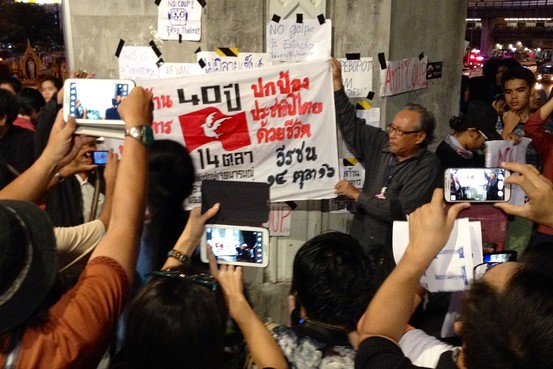If you have been following the news for the past few days, you would have known that Thailand is not in a good state right now.
You see, on 22nd May, following six months of political unrest, The Royal Thai Armed Forces launched a coup d’état against the caretaker government of Thailand, and established their own junta (military committee) called the National Council for Peace and Order (NCPO) to govern instead.
With martial law in full effect, the NCPO released twelve martial law orders – with the Southeast Asian Press Alliance revealing that five of them actually impacts media freedom and freedom of expression directly. It also meant that all state-run, satellite, and cable TV providers are only allowed to run one signal – the army’s – on their services, which will broadcast orders and announcements from the country’s new rulers. So every time someone turns on their TV in Thailand, all they will see is this:

Even with their broadcast media disrupted, the people in Thailand have been keeping busy. As reported on TechInAsia, the coup has compelled the Thais to take to the Internet for news and entertainment instead. By the second day, Dtac, Thailand’s second largest mobile company, has revealed that mobile data usage was already 25 percent higher than usual.
As anti-coup demonstrators face off against soldiers, Thais have been using social media platforms to circulate pictures and opinions around worldwide, giving an up close and personal perspective on the situation.
Here are some photos from various platforms about the situation:
Twitter:



Facebook:


Although most radio and television channels resumed their normal programming (carefully controlled, of course) late on Friday, the POMC has warned Internet users not to post anything that can be considered critical or opposing of the current military government. However, the warning was not heeded by all.
One particular user, journalist Pravit Rojanaphruk (@PravitR) tweeted,“How can the shutting of ears, eyes & mouths of Thais by guns, tanks & threat of detention bring about democracy & unity?” Another tweet later read, “The more they exercise their illegitimate power the more illegitimate they become.” He later tweeted that he was now on the media summon list.

Right now, the Internet seems to be largely unaffected; Google and YouTube are still accessible in Thailand, while popular messaging apps like Whatsapp and Line are still functional. But, with their previous censorship of YouTube in 2007, and with the POMC’s laws directly targeted at the media and the people’s freedom of speech, there is no telling whether social media will be restricted somewhere down the line.
If that happens, then the people in Thailand will truly suffer a information blackout from the rest of the world.
Let’s all hope that the situation in Thailand can be resolved soon.








